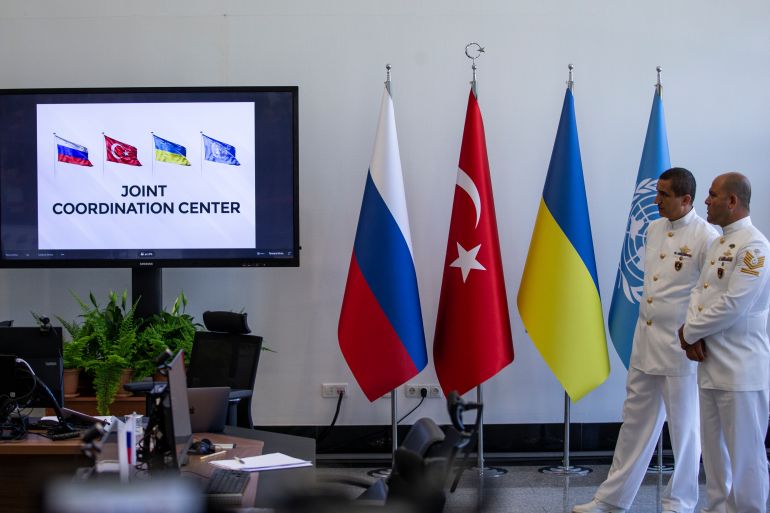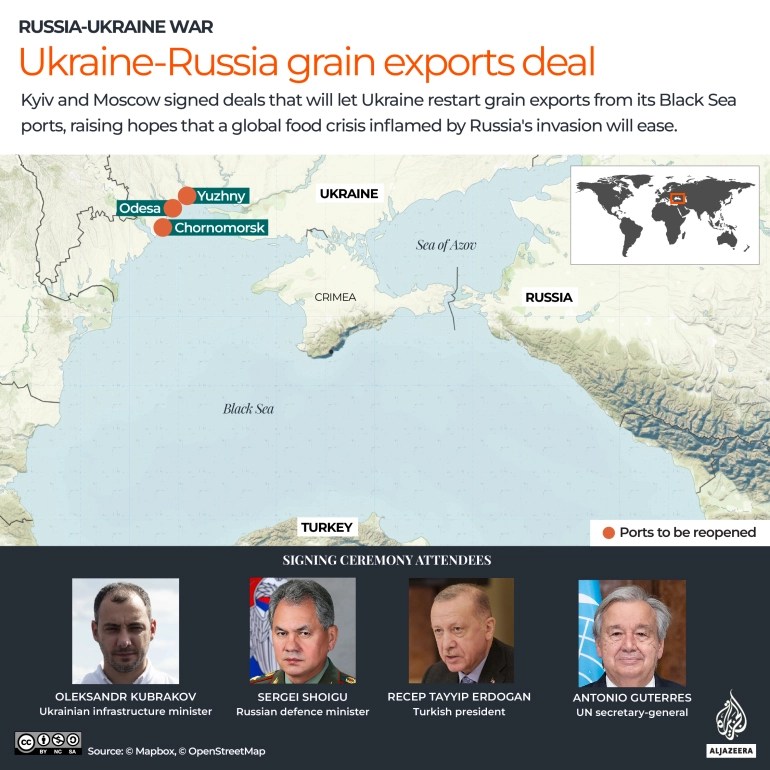UN says details for safe Ukraine grain shipments still unresolved
A UN aid chief says the first shipment of grain under a new deal could take place Friday, but ‘crucial’ details for the safe passage of ships are still being worked out.

United Nations aid chief Martin Griffiths has said he was hopeful that the first shipment of grain from a Ukrainian Black Sea port could take place as early as Friday, but “crucial” details for the safe passage of vessels were still being worked out.
Griffiths said on Thursday that Turkish, Russian and Ukrainian military officials were working with a UN team at a Joint Coordination Centre in Istanbul to hammer out standard operating procedures for the deal agreed by the four parties last Friday.
Keep reading
list of 3 itemsRussian forces launch missile attacks on northern Ukraine
Russian TV journalist fined over Ukraine comments
“That is a detailed negotiation based on the agreement,” Griffiths told UN member states in a briefing. “But without those standard operating procedures, we cannot manage a safe passage of vessels.”
“We don’t see any scale likely to happen … without our procedures being clear, understood by the commercial sector,” he later told a news conference.

He acknowledged that “the devil was in the details”, but said that so far, no major issues had emerged. Griffiths said one aspect being negotiated is the exact coordinates of the safe shipping channels.
Shipping companies and the insurers that cover vessels need to be assured that the journey is secure with no threat of mines or attacks to both the ships and their crews. These are typically covered in accepted maritime practices known as standard operating procedure.
“It’s not just a matter of whether there is a ship, or two, or three available in the ports ready to move out. They need to move safely and that means that we have to be clear where exactly the channel is,” Griffiths said.
Russia and Ukraine are major global wheat suppliers, and Moscow’s February 24 invasion of its neighbour sent food prices soaring, stoking a global food crisis that the World Food Programme says has pushed some 47 million people into “acute hunger”.
The agreement aims to allow safe passage for grain shipments in and out of Ukrainian ports, blockaded by Russia since its invasion. Russia has blamed Ukraine for stalling shipments by mining the port waters.
‘Commercial operation’
“We are hopeful … for the first ship movements to take place within days – hopefully tomorrow – out of those ports,” Griffiths said.
While Griffiths stressed that the operation to resume Ukraine grain exports was commercial – not humanitarian – he said the UN hoped poorer countries would be given priority, specifically citing Somalia, where nearly a quarter of a million people are facing starvation.
He said the UN World Food Programme is “actively looking” at buying Ukraine grain.
The head UN official at the Joint Coordination Centre, Frederick J Kenney from the International Maritime Organization, had a meeting with insurers and shipping companies on Wednesday, Griffiths said.
“I’m told that it was [a] very encouraging set of conversations,” he said. “It is commercially viable.”
Ships going in to collect grain will be inspected by the Joint Coordination Centre at a Turkish port “to ensure there’s no contraband, no weaponry going in on these vessels”, Griffiths said.
Once the ships are moving and the deal fully implemented, Griffiths said exports from the ports should eventually reach pre-war levels of about five million tonnes per month. More than 20 million tonnes of grain from last year’s harvest are still awaiting export, according to data from Ukraine.
A UN spokesperson at the centre said those checks would likely occur at an anchorage north of the Bosphorus.
UN and Turkish monitors in Ukraine’s Odesa port will then make sure that grain is loaded onto the ships. Another inspection by the Joint Coordination Centre after a ship has left Ukraine will only be warranted if it strays from the agreed plan, Griffiths said.
He said authorities knew from early on in negotiations that de-mining the approaches to Ukrainian ports was not going to work because it would take too long. UN mine officials had estimated it would take at least four months to do properly.